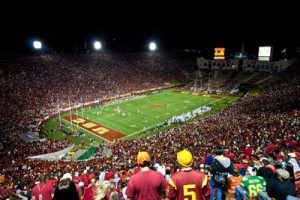USC in talks to buy Coliseum from the state
USC is currently involved in negotiations to buy state-owned property in Exposition Park, which includes the land under the Los Angeles Memorial Coliseum and Sports Arena and five surrounding parking lots.

Selling game · Spectators fill the Coliseum on game day. USC is in the process of buying the Coliseum from the state. The property has been owned by the state since 1921 and the Coliseum Commission has a lease that extends to 2054. - Daily Trojan file photo
The Coliseum and Sports Arena are currently jointly owned by the state of California, Los Angeles County and the City of Los Angeles. The Los Angeles Memorial Coliseum Commission, which has board members from each of the three ownership interests, manages the facilities according to a lease with the state.
The state approached USC with a proposal for a sale and talks began in early December, with the state initially offering to sell the property it has owned since 1921 for $54 million.
California’s current budget problems provided the impetus for the governor’s office to contact the university with the proposed sale, said Kristina Raspe, the university’s associate senior vice president of real estate and asset management.
“We’re proposing to buy the land from the state of California, and we would buy the land subject to the existing leases,” Raspe said. “The Coliseum Commission has a lease that goes through 2054, so nothing would change with regard to the operation of the Coliseum on a day-to-day basis.”
Raspe said she expected a deal to be reached by the end of December, but the negotiation process was extended when the Board of Directors for Exposition Park and the California Science Center decided on Dec. 22 to continue studying all aspects of the offer before approving the sale.
Los Angeles City Council members Bernard Parks, Jan Perry and Ed Reyes had contacted the Board to request that there be “adequate community outreach and discussion” before a sale was approved, according to the Daily News.
Councilman Parks, who is also a member of the Coliseum Commission, expressed concern about land in a public park being sold to a private entity such as USC.
“Rather than go and make a decision about a sale, they should create the prospect of a designated buyer while having the process done in a public setting so that everybody knows the ramifications of what they’re talking about,” Parks said. “The public needs to know what it’s going to mean to have a public park go into private hands.”
Parks said he stressed the importance of communication in the sale because there are too many questions surrounding technicalities of the sale that even members of the Coliseum Commission don’t know the answers to.
Negotiations are likely to take at least two to three months, Raspe said, and any deal will have to be approved by newly inaugurated Gov. Jerry Brown.
The Coliseum Commission would still be in charge of any maintenance, improvements and leasing opportunities for the stadium, and USC would pay rent for six days a year for each home football game.
Because of the Coliseum’s status as a national historic landmark, a complete redevelopment of the property is unlikely. The stadium will continue to benefit from improvements, but its landmark status restricts what can be done with the land.
The Sports Arena, though, is already the subject of redevelopment plans. According to the Coliseum Commission, the current arena is underutilized and in need of several structural upgrades.
Two months ago, the commission submitted an environmental impact report for circulation that outlines redevelopment of the property into either a Major League Soccer stadium or an open-air amphitheater and multiple-use space.
Raspe said USC is supportive of the Coliseum Commission’s plans for redevelopment of the Sports Arena and, in the event of a successful purchase of the property, would have input in the process of redevelopment.
Raspe said that despite the long negotiations ahead, the university is optimistic about the potential sale.
“It’s a nice way to preserve all the properties in the park while allowing the university to upgrade them,” she said. “People seem to be positive, but there’s a long way to go before we have a deal.”
The Coliseum Commission’s lease on the structures would remain in place even if USC were to buy the property on which they are built. It would continue to operate the Coliseum and Sports Arena while the university would act as the landlord of the commission.
Parks questioned exactly how such a relationship between the commission and the university would work in the event of a sale, especially since the university would then be “both a landlord and a tenant.”
The parking lots would still have to be available for the museums and events at the Coliseum and Sports Arena, but they would provide additional overflow parking for the university, should it be necessary, Raspe said.

I have fond memories of the LA Sports Arena as a concert venue. I’ll be interested in seeing what will ultimately be its fate.
Sweet baby jesus! An MLS stadium would be incredible in place of the sports arena.